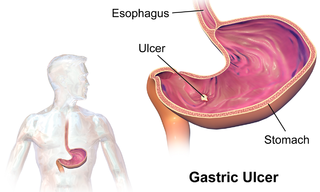
Kidney failure, also known as end-stage kidney disease, is a medical condition in which the kidneys can no longer adequately filter waste products from the blood, functioning at less than 15% of normal levels. Kidney failure is classified as either acute kidney failure, which develops rapidly and may resolve; and chronic kidney failure, which develops slowly and can often be irreversible. Symptoms may include leg swelling, feeling tired, vomiting, loss of appetite, and confusion. Complications of acute and chronic failure include uremia, high blood potassium, and volume overload. Complications of chronic failure also include heart disease, high blood pressure, and anemia.

Chronic kidney disease (CKD) is a type of kidney disease in which a gradual loss of kidney function occurs over a period of months to years. Initially generally no symptoms are seen, but later symptoms may include leg swelling, feeling tired, vomiting, loss of appetite, and confusion. Complications can relate to hormonal dysfunction of the kidneys and include high blood pressure, bone disease, and anemia. Additionally CKD patients have markedly increased cardiovascular complications with increased risks of death and hospitalization.
The Environmental Determinants of Diabetes in the Young is a longitudinal study examining the environmental causes of Type 1 diabetes (T1D), formerly known as juvenile diabetes. The study follows children at high genetic risk for T1D from birth to 15 years of age.
The National Digestive Diseases Information Clearinghouse (NDDIC) is an information dissemination service of the National Institute of Diabetes and Digestive and Kidney Diseases (NIDDK). The NIDDK is part of the National Institutes of Health, which is under the U.S. Department of Health and Human Services.

National Diabetes Education Program (NDEP) was started by the NIH and CDC in 1997 to educate the public about the risks of diabetes. NDEP's goal was to reduce the illness and death caused by diabetes and its complications. To help meet this goal, NDEP provided free diabetes education information to the public. NDEP ended in 2019.

An ulcer is a discontinuity or break in a bodily membrane that impedes normal function of the affected organ. According to Robbins's pathology, "ulcer is the breach of the continuity of skin, epithelium or mucous membrane caused by sloughing out of inflamed necrotic tissue." Common forms of ulcers recognized in medicine include:

Polycystic kidney disease is a genetic disorder in which the renal tubules become structurally abnormal, resulting in the development and growth of multiple cysts within the kidney. These cysts may begin to develop in utero, in infancy, in childhood, or in adulthood. Cysts are non-functioning tubules filled with fluid pumped into them, which range in size from microscopic to enormous, crushing adjacent normal tubules and eventually rendering them non-functional as well.

Globally, an estimated 537 million adults are living with diabetes, according to the latest 2019 data from the International Diabetes Federation. Diabetes is the 9th leading cause of mortality globally in 2020, attributing to over 2 million deaths annually due to diabetes directly and kidney disease due to diabetes. The primary causes of type 2 diabetes is diet and physical activity, which can contribute to increased BMI, poor nutrition, hypertension, alcohol use and smoking, while genetics is also a factor. Diabetes prevalence is increasing rapidly; previous 2019 estimates put the number at 463 million people living with diabetes, with the distributions being equal between both sexes icidence peaking around age 55 years old. The number is projected to 643 million by 2030, or 7079 individuals per 100,000, with all regions around the world continue to rise. Type 2 diabetes makes up about 85-90% of all cases. Increases in the overall diabetes prevalence rates largely reflect an increase in risk factors for type 2, notably greater longevity and being overweight or obese. The prevalence of African Americans with diabetes is estimated to triple by 2050, while the prevalence of whites is estimated to double. The overall prevalence increases with age, with the largest increase in people over 65 years of age. The prevalence of diabetes in America is estimated to increase to 48.3 million by 2050.
The National Institute of Diabetes and Digestive and Kidney Diseases (NIDDK) is part of the United States National Institutes of Health, which in turn is part of the Department of Health and Human Services. NIDDK is approximately the fifth-largest of the 27 NIH institutes. The institute's mission is to support research, training, and communication with the public in the topic areas of "diabetes and other endocrine and metabolic diseases; digestive diseases, nutritional disorders, and obesity; and kidney, urologic, and hematologic diseases". As of 2021, the Director of the institute is Griffin P. Rodgers, who assumed the position on an acting basis in 2006 and on a permanent basis in 2007.
Diabetes, in particular, non-insulin dependent diabetes, is prevalent in the Aboriginal and Torres Strait Islander populations of Australia. As many as 1 in 20 Australians are said to suffer from diabetes, and of this amount, Aboriginal people are three times as likely to succumb to this disease, in comparison to non-Aboriginal people. In contrast with type 1 diabetes, which is a predisposed autoimmune condition, type 2 diabetes or insulin-resistant diabetes, is a preventable disease, heavily influenced by a multitude of socioeconomic factors. Sufferers of the disease are consequently more susceptible to chronic health issues, including heart disease and kidney failure. Conclusively, this has contributed to the 17 year life expectancy gap between Aboriginal people and non-Aboriginal people and in turn, has led to disparity and inequity of health between Aboriginal people and non-Aboriginal people.
Penny Gordon-Larsen is an American nutrition scientist. She is the Carla Smith Chamblee Distinguished Professor of Global Nutrition at the UNC Gillings School of Global Public Health at the University of North Carolina at Chapel Hill, where she served as Associate Dean for Research from 2018 to 2022. In March 2022, she was named interim Vice Chancellor for Research for the University of North Carolina at Chapel Hill. She is also a Faculty Fellow at the Carolina Population Center. Dr. Gordon-Larsen’s NIH-funded research portfolio focuses on individual-, household-, and community-level susceptibility to obesity and its cardiometabolic consequences, and her work ranges from molecular and genetic to environmental and societal-level factors. She was the 2015 president of The Obesity Society and a member of the National Institute of Diabetes and Digestive and Kidney Diseases Clinical Obesity Research Panel (CORP).

Katherine McJunkin is an American biologist. She is the Stadtman Investigator in the Section On Regulatory RNAs, Laboratory of Cellular and Developmental Biology at the National Institute of Diabetes and Digestive and Kidney Diseases.

Judith E. Fradkin is an American physician-scientist. She was the director of the Division of Diabetes, Endocrinology, and Metabolic Diseases at the National Institute of Diabetes and Digestive and Kidney Diseases from 2000 to 2018.

Leslie Joan Baier is an American scientist. She is a senior investigator in diabetes molecular genetics at the National Institute of Diabetes and Digestive and Kidney Diseases.

Carole Ann Bewley is an American chemist. She is a senior investigator and Chief of the Laboratory of Bioorganic Chemistry at the National Institute of Diabetes and Digestive and Kidney Diseases. Bewley researches secondary metabolites and basic principles involved in protein-carbohydrate interactions and how these can be exploited to engineer therapeutics.

Deborah Meetze Hinton is an American microbiologist. She is a senior investigator and chief of the gene expression and regulation section in the laboratory of cell and molecular biology at the National Institute of Diabetes and Digestive and Kidney Diseases.

Cuilin Zhang is a Chinese-American epidemiologist and physician-scientist researching the roles of genetic and environmental factors in the pathogenesis of gestational diabetes, type 2 diabetes, and obesity and health consequences of these complications. Zhang is a senior investigator and acting chief of the epidemiology branch at the Eunice Kennedy Shriver National Institute of Child Health and Human Development.

Vera Marie Nikodem was a Czechoslovak-American molecular biologist who served as a section chief at the National Institute of Diabetes and Digestive and Kidney Diseases.

Christine M. Hunter is an American clinical psychologist and military officer. She is the acting National Institutes of Health (NIH) associate director for behavioral and social sciences research and acting director of the NIH Office of Behavioral and Social Sciences Research. Hunter was an active duty officer in the U.S. Air Force from 1996 to 2006. She is a captain in the U.S. Public Health Service Commissioned Corps.

Nancy Ruth Goldman Nossal was an American molecular biologist specialized in the study of DNA replication. She was chief of the laboratory of molecular and cellular biology at the National Institute of Diabetes and Digestive and Kidney Diseases from 1992 to 2006.















